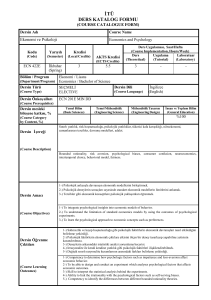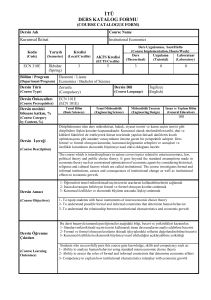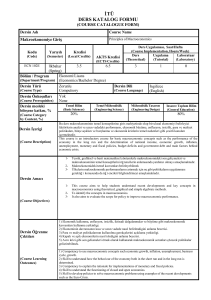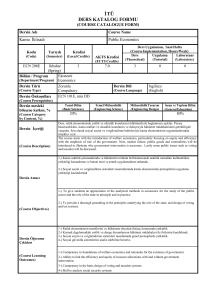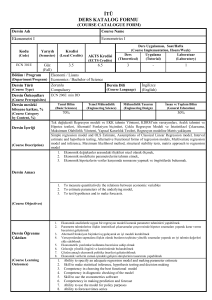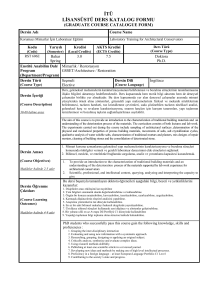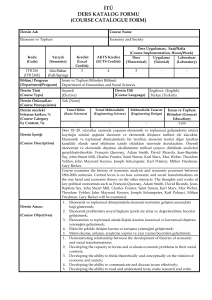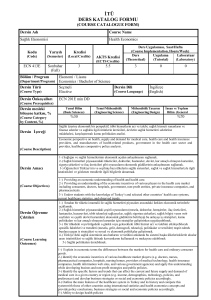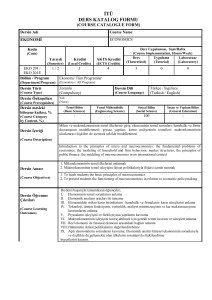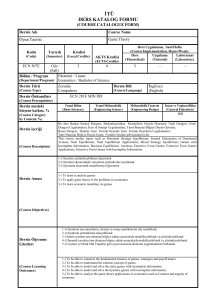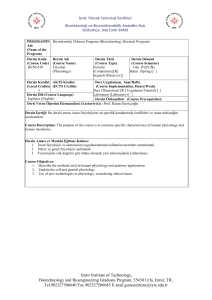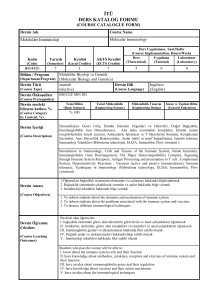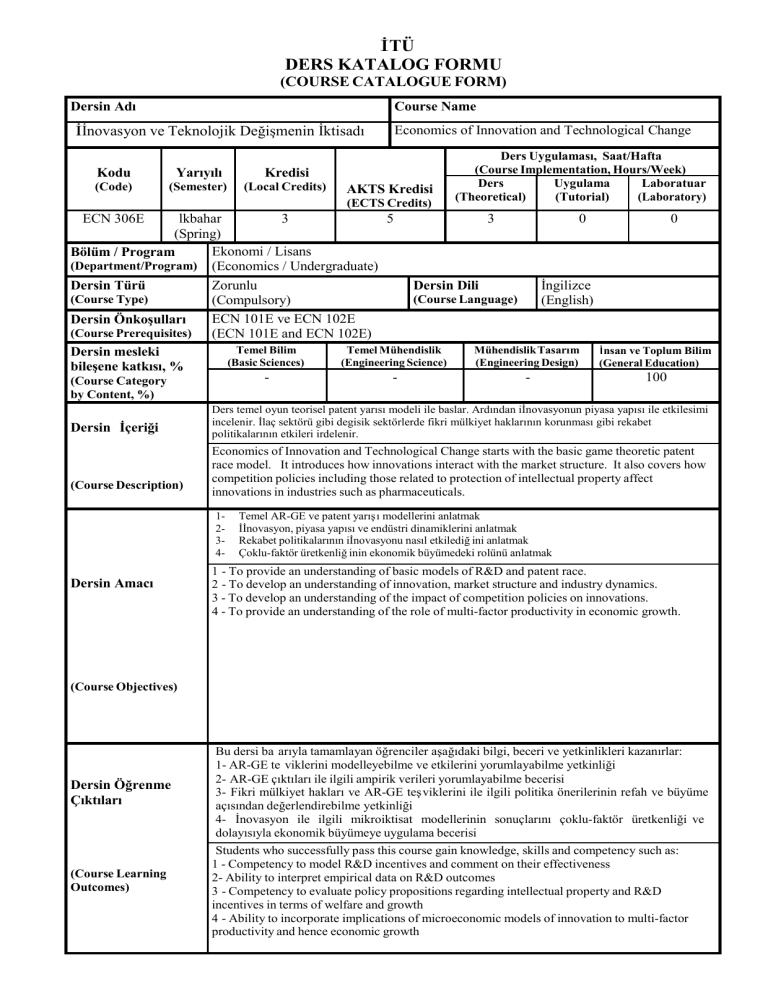
İTÜ
DERS KATALOG FORMU
(COURSE CATALOGUE FORM)
Dersin Adı
Course Name
İİnovasyon ve Teknolojik Değişmenin İktisadı
Kodu
Yarıyılı
Kredisi
(Code)
(Semester)
(Local Credits)
Economics of Innovation and Technological Change
AKTS Kredisi
(ECTS Credits)
Ders Uygulaması, Saat/Hafta
(Course Implementation, Hours/Week)
Ders
Uygulama
Laboratuar
(Theoretical)
(Tutorial)
(Laboratory)
ECN 306E
3
5
3
0
0
lkbahar
(Spring)
Ekonomi / Lisans
Bölüm / Program
(Department/Program) (Economics / Undergraduate)
Zorunlu
İngilizce
Dersin Türü
Dersin Dili
(Course Type)
(Course Language)
(Compulsory)
(English)
ECN 101E ve ECN 102E
Dersin Önkoşulları
(Course Prerequisites)
(ECN 101E and ECN 102E)
Temel Bilim
Temel Mühendislik
Mühendislik Tasarım
İnsan ve Toplum Bilim
Dersin mesleki
(Basic
Sciences)
(Engineering
Science)
(Engineering Design)
(General Education)
bileşene katkısı, %
100
(Course Category
by Content, %)
Dersin İçeriği
(Course Description)
Ders temel oyun teorisel patent yarısı modeli ile baslar. Ardından iİnovasyonun piyasa yapısı ile etkilesimi
incelenir. İlaç sektörü gibi degisik sektörlerde fikri mülkiyet haklarının korunması gibi rekabet
politikalarının etkileri irdelenir.
Economics of Innovation and Technological Change starts with the basic game theoretic patent
race model. It introduces how innovations interact with the market structure. It also covers how
competition policies including those related to protection of intellectual property affect
innovations in industries such as pharmaceuticals.
1234-
Dersin Amacı
Temel AR-GE ve patent yarışı modellerini anlatmak
İİnovasyon, piyasa yapısı ve endüstri dinamiklerini anlatmak
Rekabet politikalarının iİnovasyonu nasıl etkilediğ ini anlatmak
Çoklu-faktör üretkenliğ inin ekonomik büyümedeki rolünü anlatmak
1 - To provide an understanding of basic models of R&D and patent race.
2 - To develop an understanding of innovation, market structure and industry dynamics.
3 - To develop an understanding of the impact of competition policies on innovations.
4 - To provide an understanding of the role of multi-factor productivity in economic growth.
(Course Objectives)
Dersin Öğrenme
Çıktıları
(Course Learning
Outcomes)
Bu dersi ba arıyla tamamlayan öğrenciler aşağıdaki bilgi, beceri ve yetkinlikleri kazanırlar:
1- AR-GE te viklerini modelleyebilme ve etkilerini yorumlayabilme yetkinliği
2- AR-GE çıktıları ile ilgili ampirik verileri yorumlayabilme becerisi
3- Fikri mülkiyet hakları ve AR-GE teşviklerini ile ilgili politika önerilerinin refah ve büyüme
açısından değerlendirebilme yetkinliği
4- İnovasyon ile ilgili mikroiktisat modellerinin sonuçlarını çoklu-faktör üretkenliği ve
dolayısıyla ekonomik büyümeye uygulama becerisi
Students who successfully pass this course gain knowledge, skills and competency such as:
1 - Competency to model R&D incentives and comment on their effectiveness
2- Ability to interpret empirical data on R&D outcomes
3 - Competency to evaluate policy propositions regarding intellectual property and R&D
incentives in terms of welfare and growth
4 - Ability to incorporate implications of microeconomic models of innovation to multi-factor
productivity and hence economic growth
Ders Kitabı
Scotchmer, S. (2004). Innovation and Incentives, MIT Press
(Textbook)
Diğer Kaynaklar
Verspagen, B. (2005). The Economics of Technological Change, Manuscript
(Other References)
Ödevler ve Projeler
Laboratuar Uygulamaları
Öğrenciler haftalık verilen okumaları yapmaları ve verilen problemleri çözmeleri
gerekmektedir. Ayrıca bir donem projesi yapmaları gerekmektedir.
The students should read the assigned materials and solve the assigned problems.
They should also write a term paper.
Yok
(Laboratory Work)
None
Bilgisayar Kullanımı
Yok
(Computer Use)
None
Diğer Uygulamalar
Yok
(Other Activities)
None
Baş arı
Değerlendirme
Sistemi
Faaliyetler
(Activities)
Yıl İçi Sınavları
(Midterm Exams)
Kısa Sınavlar
(Quizzes)
Ödevler
(Homework)
Projeler
(Projects)
Dönem Ödevi/Projesi
(Term Paper/Project)
Laboratuar Uygulaması
(Laboratory Work)
Diğer Uygulamalar
(Other Activities)
Final Sınavı
(Final Exam)
(Homework & Projects
(Assessment Criteria)
Adedi
(Quantity)
1
Değ erlendirmedeki Katkısı,
% (Effects on Grading, %)
%30
5
%15
1
%15
1
%40
DERS PLANI
Hafta
1
2
3
4
5
6
7
8
9
10
11
12
13
14
Konular
Temel Mikroiktisat Tekrarı
Bilgi Malları ve İnovasyonun Temel Mekanizması
Fikri Mülkiyetin Temelleri
Fikri Mülkiyetin Tasarımı
Birikmi Olma Durumu
Ekonomik Degisme ve İnovasyonun Evrimsel Teorisi
Teknolojik Degisim ve Endüstrilesme
Teknoloji Adaptasyona Giriş
Ag Etkileri ve Bazı Örnekler
Sistem Rekabeti ve Standartlaş ma
AR-GE’ye Kamu Desteğ i
Küresellesme ve İnovasyon-I
Küresellesme ve İnovasyon-II
İnovasyonla ilgili Gelecek Politika Meseleleri
Dersin
Çıktıları
1,2
2,4, 6
2,6
2,6
2,4,6
2,4,6
2,4,6
4,8
2,6
2,6
2,4,6
4,6,8
4,6,8
2,4,6,8
COURSE PLAN
Weeks
1
2
3
4
5
6
7
8
9
10
11
12
13
14
Topics
Microeconomics Basics
Information Goods and Basic Mechanism for Innovations
Intellectual Property Basics
Intellectual Property Design
Cumulativeness
Evolutionary Theory of Economic Change and Innovation
Technological Change and Industrialization
Introduction to Technology Adoption
Network Effects and Some Examples
System Competition and Standardization
Public Support of R&D
Globalization and Innovation I
Globalization and Innovation II
Future Policy Issues on Innovation
Course
Outcomes
1,2
2,4, 6
2,6
2,6
2,4,6
2,4,6
2,4,6
4,8
2,6
2,6
2,4,6
4,6,8
4,6,8
2,4,6,8
Dersin Ekonomi Lisans Programıyla İlişkisi
Programın mezuna kazandıracağı bilgi, beceri ve yetkinlikler (programa ait çıktılar)
Ekonomik ve sosyal problemleri, temsili aktörlerin amaç fonksiyonlarını bir takım kısıtlara tabi
olarak maksimize ettikleri ve buna baglı olarak çesitli tarz dengelerin olustugu ortamlar seklinde
matematiksel olarak modelleyen iktisadi yaklasımda yetkinlik.
ii.
Mikroiktisadi fiyat sistemini özel ve kamu malları ve uluslar arası ticaret baglamında ögrenip is
stratejileri ve kamu politikaları tasarımında etkinlik ve esitlik dengesini gözeterek hukuk
çerçevesinde kullanabilme yetkinligi. Bulguları Türkçe veya ingilizce olarak ifade edebilmek
Fiyatların genel düzeyi, issizlik ve çıktı düzeyine iliskin temel makroekonomik modelleri inşa
iii.
edebilme kabiliyeti. Bulguları Türkçe veya ingilizce olarak ifade edebilme becerisi.
iv.
Ekonomik büyüme ve teknolojik geli menin belirleyenlerini, sosyal fayda ve sosyal maliyetlerini
değerlendirebilme kabiliyeti.
v.
statistiki ve ekonometrik modelleme ve yöntemleri iktisadi ve sosyal verilerin bilgisayar
ortamında analiz edilmesinde ve yorumlanmasında temel düzeyde kullanabilme yetkinliği.
Bulguları Türkçe veya ngilizce olarak ifade edebilme becerisi.
vi.
Bir sektörün ekonomisinde uzmanlık geli tirme kabiliyeti. Yerli veya yabancı bir ülkedeki bir
sektörde uzmanlık.
vii.
Karar verme alanındaki standart iktisadi modellerde ve karar vermeye ilişkin alternatif
varsayımlarda yetkinlik.
viii.
Yurt içinde veya dışındaki ekonomik kurumlar ve düzenlemeleri, tarihi, hukuki ve sosyal altyapıyı
dikkate alarak analiz etme yetkinliği. Bu tür bir analizi sektörel uzmanlıkla birleştirme becerisi.
1: Az, 2. Kısmi, 3. Tam
Katkı
Seviyesi
1
2
3
i.
X
X
X
X
X
X
X
X
The Relationship of the Course with the Bachelor of Science Program in Economics
The Knowledge, Skills and Competencies that Students will Gain from the Program
(Program Outputs)
Competency in the fundamental economic approach that models economic and social problems
i.
mathematically as environments with various types of equilibria where representative agents
maximize their objective functions subject to a set of constraints.
Competency in the microeconomic price system in the context of private and public goods and
ii.
international trade, and the ability to design business strategies and public policies considering
efficiency-equity balance and the legal framework. Skill to express findings in Turkish or
English.
Ability to construct basic macroeconomic models regarding the general price level,
iii.
unemployment, and output. Skill to express findings in Turkish or English.
Ability to assess the social benefits, costs, and determinants of economic growth and technological
iv.
advancement.
Competency in statistical and econometric modeling and methods to analyze and interpret at a
v.
basic level economic and social data in a computerized environment. Skill to express findings in
Turkish or English.
Ability to develop expertise in the economics of a sector. Specialty in a domestic or foreign
vi.
sector.
Competency in economic models of decision making and in alternative assumptions related to
vii.
decision-making.
Competency to analyze domestic or foreign economic institutions and regulations considering the
viii.
historical, legal, and social infrastructure. The skill to combine such an analysis with sectoral
expertise.
1: Low, 2. Partial, 3. Full
Düzenleyen (Prepared by)
Tarih (Date)
14/06/2014
1
Level
2
3
X
X
X
X
X
X
X
İmza (Signature)
X

